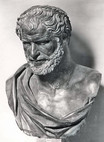 Romeo and Juliet – as an entity – have ascended their play. They have become Love incarnate, a paragon of youth, the symbol for struggle in an oppressive society – they have transformed into paintings, ballets, musicals, zombies &c. Even before their revitalization in the 19th century, the two star-crossed lovers were a success and helped propel Shakespeare into the world as a tragedian (Titus Andronicus was not entirely successful at this, as popular as it was). Shakespeare even prophesizes this success at the end of the play:
This is, however, a double-edged sword. If the lovers have outgrown their play, so has their love outgrown its context. The love of these two have risen above its lyric roots, its satirical element, and its careful construction: for these reasons, it is often misconstrued. The most prevalent complaint I hear from students who have studied this play is that it is too fake, that “people don’t talk like that.” I have to explain that, even in 1595, people didn’t talk to each other in sonnets (see Romeo and Juliet’s first meeting in I.v). Teachers, directors, and people in general all have a tendency to take this play too seriously, and to ignore the constructed nature of it. I want to take this opportunity to place the two lovers in their proper context, exploring the play as it was before it grew to its present height. To do this, I wish to use as my jumping off point a seemingly minor detail about a very minor character – that is the death of Lady Montague. 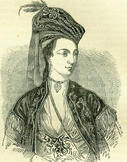 Lady Montague dies at the end of the play, concurrently to the climactic catastrophe. We learn of her death from Old Montague. Of course, the simple answer to the question of why does Lady Montague die is given to us by Old Montague: PRINCE Simple enough. But it seems to come out of left field at first, doesn’t it? After all that has happened, can the death of a character who is in two scenes (silent in one of them), and has a grand total of three lines – can she inspire the necessary pathos that a tragic death demands? But when we examine this moment in the context of the play, it begins to fit into place. Everything in Excess In Romeo and Juliet, we are dealing with a heightened reality. The play may be set in contemporary Verona (there's some debate about that), but it is not a world the audience would have recognized. Here is just a quick list of some of the heightened reality in this play There are three sonnets: We have two prologues, both in sonnet form. As well, there is the famous meeting between Romeo and Juliet, here transcribed into its sonnet form: If I profane with my unworthiest hand Lyrical language: Romeo and Juliet is one of Shakespeare’s three “lyrical plays” written around 1595. The language is almost exclusively verse, but not only that, is grander than you find in his other plays. Such lines as: But all so soon as the all-cheering sun
Romeo is prompted to this speech by the remains of a previous fight: a fight that has far more to do with hate – and vanity – than love. The idea that everything prompts him to feel the dualistic forces of love would have provoked laughter in an audience forced to study Petrarch in school: this is why Romeo asks Benvolio “dost thou not laugh?” Benvolio is probably the only one not laughing. Mercutio draws this comparison when he notes that Romeo out Petrarchs Petrarch: “Laura to his lady [Rosaline] was but a kitchen wench” (II.iv). While Romeo pines for Rosaline – or when his friends think he pines for Rosaline – he is not a tragic figure, nor one that inspires pity: the Romeo of the first two acts is a comic lover – much in the same way Orlando is in As You Like It. The timeframe: If you know this play, you probably know the exaggerated timeframe. Romeo and Juliet meet on a Sunday evening, propose on Sunday night, marry Monday afternoon, part forever Monday evening, and die together Wednesday night. This is not a normal relationship nor is it meant to be. For all the meticulous timekeeping that goes on in this play, there is a lot of muddling of time. Old Capulet fumbles over what day it is at any given point, probably because he doesn’t seem to sleep at all during the play. There is some confusion of whether the final actions of the play take place on Wednesday or Thursday night (it’s Wednesday) because Old Capulet constantly changes what day it is, or on what day the wedding is supposed to happen. Romeo and Juliet too fumble over the hours. After she learns that Romeo slew Tybalt, Juliet laments: In the next scene, which takes place at the same time or just after III.ii, Romeo laments I am inclined to believe Juliet here because she has done nothing but wait and count the hours at this point. The discrepancy may be an error, but more likely, it shows how fickle time is in the heat of such passion. Romeo and Juliet, just like their play, overcome time: forcing eternity into four short days. Given all of this, why should death reflect a natural reality? After the climactic tragedy, should there not be more woe? Should not the grief be as heightened as everything else? Such is why the death – the tragedy – does not end where we expect it to, but continues with one final death. A Constructed World There is constructed language (the use of lyricism) and constructed reality, but the play itself is also very carefully crafted. There are a lot of parallels that exist in this play – everything seems to be in balance. Fate and Fortune play a large role in the play: we have, after all, star-crossed lovers. There is a sense that someone, some external force, is controlling everything. In The Tempest this force is Prospero, in Romeo and Juliet it is an unseen Author. Or it is the Prologue and the whole thing is meant to be seen as a story: such metafictional interpretations are not too farfetched. Let’s start with the first prologue. Imagine you are seeing this play for the first time and know nothing about Romeo and Juliet. The Prologue steps on stage and begins his speech:
You get the idea. The prologue points out the inherit constructed nature of theatre and genre. We are dealing with The Most Excellent and Lamentable Tragedy of Romeo and Juliet – we know that convention dictates that Romeo and Juliet will die. Being so explicitly reminded of this fact at the start of the play does not ruin the play, but adds an exciting element to it. Their death hang over everything that happens in the play: including the first comedic half. That’s right – the first half of this play is a comedy. In The Winter’s Tale, Shakespeare uses the figure of Time to transform a clear-cut tragedy (the first three acts of the play) into a pastoral comedy (Act IV), before muddying up the waters of comedy and tragedy. In Romeo and Juliet, the transition is more seamless, but the arc of both comedy and tragedy are present. In “The Comedy of Romeo and Juliet”, two lovers have a problem that they must overcome. Romeo is saddened because Rosaline will not return his love. Juliet is troubled over the fact that her parents are trying to force a marriage on her. When they meet and fall in love, they are faced with a new problem – they are supposed to be enemies. They overcome their trials and the whole thing ends in a marriage. A straightforward comedy. The first half also contains the prevalent comedic characters of the play: the Nurse, and Mercutio. The Nurse cuts the tension that is the conflict between Juliet and her mother by providing bawdy stories and crude humour. 'dost thou fall upon thy face? Trust me, it's funny. Mercutio is one of the greatest wits in Shakespeare, and a precursor to Falstaff. The 17th century poet, Dryden, mused about how Shakespeare had to kill Mercutio before Mercutio killed him. People foolishly think that Shakespeare himself said this, and it is certainly not true. Yet, Romeo and Juliet. as a play would have been destroyed if Mercutio were allowed to live. Mercutio is right at home in the Comedy of Romeo and Juliet, but would never be able to survive in the Tragedy. But I must move away from Mercutio before he kills me. So when Romeo and Juliet profess their love and engage in the sublime “balcony scene” – we may luxuriate in their love and their poetry, but the ending – the tragedy – looms. But, soft! what light through yonder window breaks? Not much needs to be said here. This is some of the finest poetry written in the English language: heightened only by the fact that we know that it is fleeting. This love is doomed before it began. If we thought that they would have a happy ending then this speech and others might just be sentimental bathetic drivel – but here, this is such unfulfilled yearning that we may smile at the poetry and weep at what we know will happen, and these chaotic emotions fuel this play. Following the comedic half, we have the tragic half of the play, which begins with the death of Mercutio. Here we begin to see some of the parallels between the two halves. Both begin with a brawl in the street between Montague and Capulet, one that draws the citizens and the Prince. In the comic half, no one is hurt and no consequences are laid. In the tragic half, Mercutio and Tybalt are slain and Romeo is banished. Also, both Old Montague and Capulet are given a hefty fine for their part in the tragedy: But I'll amerce you with so strong a fine Just so I don’t get called out by anyone who thinks the Prince is being metaphorical here, amerce denotes a pecuniary penalty. This point is often downplayed in respect to the human tragedy of the scene, but the economic status of the two households does play a role, and is mentioned before all else – in the first line of the play. At the end of the comedic brawl, Romeo comments that “Here's much to do with hate, but more with love” (I.i). This is not true of the comedic brawl, but it is of the tragic one. Mercutio is slain because Romeo’s love of Juliet prompts him to try to stop the fight. Tybalt is slain because of Romeo’s love for Mercutio. The first fight shows a comic satire of love’s destructive power: the second fight shows the tragic realization.  When we are introduced to Romeo in the comedic half of the play, we learn that he wanders at night and during the day shuts himself up and creates an artificial night. Romeo seeks to the night to compliment his “inky cloak” as Hamlet would say. Again, we are meant to see this as a satire of a man destroyed by a love he never had. Picture a teenager hiding out in his room listening to Radiohead because the girl he has been dating for a month broke up with him – the times have not changed. You try to feel bad for him, but you don’t. But when we are introduced to Juliet in the tragic half of the play, she is “singing” her aubade – her morning love song. She calls out for the night: And bring in cloudy night immediately. Juliet, too, rejects the day, and wishes for an artificial night: not to escape the pains of love, but night is when she and Romeo will be together again. Of course, the tragedy is we know that Romeo has already been banished, even if Juliet does not. The Nurse serves as a third parallel for the two halves of the play. In the tragic half, she has lost her mirth after she witnesses Tybalt’s dead body. Her comic stumbling over words and drawn out tales turns into tragic stumbling over words and drawn out tales. In Iv.v, she wails the loudest and fiercest of all the Capulets upon finding Juliet “dead”. Her incessant laughter while telling the story of Juliet falling on her back is turned to incessant tears. Lady! lady! lady! When she calls for her alcohol (aqua vitae) in II.v, it is part of the comedy of her “aching bones”. Here, she probably needs it to steady herself so she doesn’t pass out. The remainder of her lines in the scene devolve into cries. O woe! O woful, woful, woful day! She is still over the top, but the comedy has become tragedy. While I am on the subject of this scene: this is the height of genre bending in this play. We have an over-the-top tragedy that can be played very garishly. It is tempered by the fact that Juliet is not really dead, but has just taken a potion to simulate death. This allows us some respite and even to find a bit of comedy in the “woes” until we again realize that Juliet will, in the end, kill herself. Thus this moment is transformed internally, and perhaps subconsciously, from garish, to comedic, to sublime. Let us come full circle before I overdo myself. This play is very carefully constructed and relies on a sense of balance or fate. So here is the roster of deaths at the point where Juliet takes her life CAPULETS – Tybalt, Juliet MONTAGUES – Romeo Related to THE PRINCE – Mercutio, Paris It seems a little off-balance doesn’t it? Balance must be preserved and everything must be in order according to this unseen force. Add to this that I have already highlighted two instances where we see human life treated as economic property (at the end of III.i and at the end of V.iii) and it makes sense that things should equal out for all three “houses” involved. So the Montagues must lose one more to even the score: Benvolio would have been a possible and interesting choice – but Shakespeare chose Lady Montague. Why? The Theatre World We know that the tragedy had to overextend the climactic finale. We know that the death had to be from the Montage side. Why Lady Montague instead of Benvolio? Is it possible that the whole matter comes down to a practical reason? This is a play, and a play is, to an extent, confined to its physical limitations. You must be able to stage it. One such limitation at the time was the amount of actors Shakespeare had at his disposal. There were only a certain amount of principal actors in Shakespeare’s company c. 1595. There may have been day labourers hired to hold a spear or trumpet, or be part of a crowd, but if a character spoke a solo line he (for it was only he) was part of the principal cast. If we looked at the stage at the close of the show, we would see: Romeo (dead) Juliet (dead) Paris (dead) Old Montague Old Capulet Lady Capulet Prince Friar Laurence Balthasar Paris’ Page 1st Watchman 2nd Watchman 3rd Watchman It is very rare that you find this many principal characters (they all have a least one solo line) on stage at the same time, and you never find more at this time period. The most likely scenario is that the actor who played Lady Montague is on stage. I have read a suggestion that the actor who played Lady Montague was also Paris – it makes sense but I cannot confirm it either way. In the reality of the play, it makes sense for the parents of Romeo and Juliet to rush to the scene. There is no reason Lady Montague would have been unnoticeably absent, but because she could not be physically present, she must be dead. What I love about Shakespeare are these unanswerable questions that remind us that his plays are intricate tapestries. Maybe I’m completely off and the death of Lady Montague is completely arbitrary. I don’t think that matters. While we write about Shakespeare, we are searching for meaning beyond what a single person may have thought centuries ago. I just wish to demonstrate that, despite how much has been written about Romeo and Juliet, we have not exhausted the play. It can always be new, it can always be beautiful, and it doesn’t have to be reduced to high philosophy or a sappy love story.
0 Comments
Leave a Reply. |
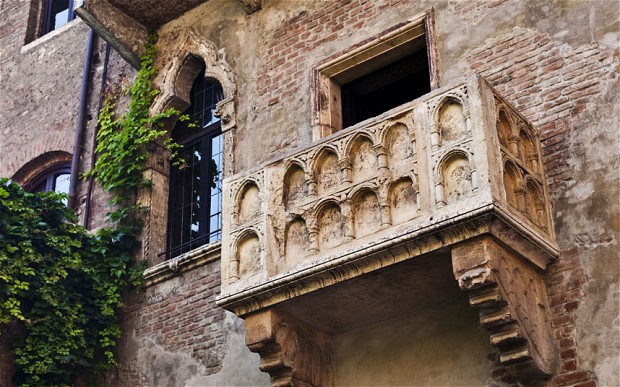
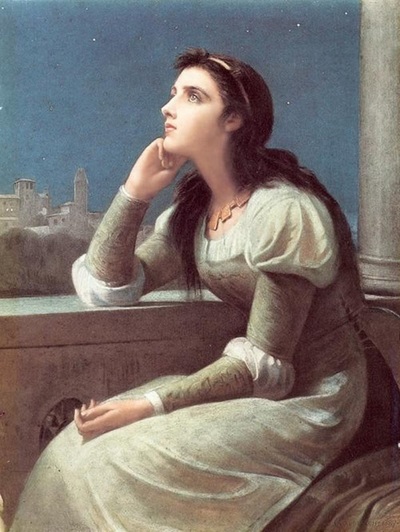
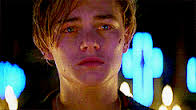
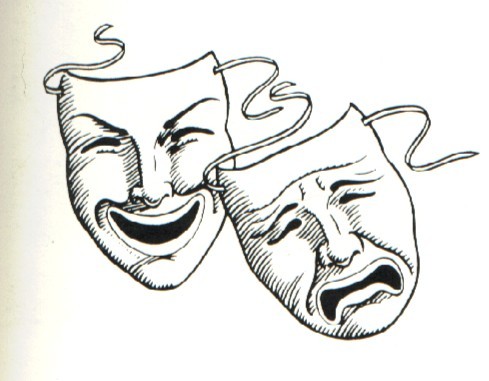
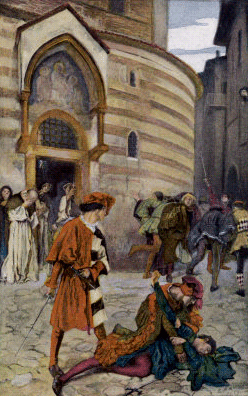
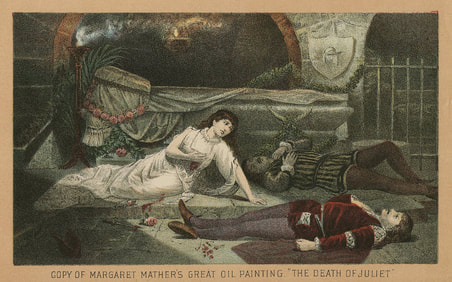
 RSS Feed
RSS Feed